Y5 Rabbit Holes and Wardrobes
£3.00
KS2 National Curriculum:
✓ Identify structure and presentation
✓ Infer and discuss differences between texts
Activities in this lesson include looking at the use of portals and the passing of time in fantasy stories and considering the types of stories in which portals are needed. Activities in this lesson also include answering higher order questions on portals and the passing of time.
There is a five-minute evidence-based CPD activity at the end of this lesson which will develop classroom teachers’ skill set. This CPD consists of a research extract on self-assessment with a five-minute activity based on this extract.
Description
These evidence-based learning (EBL) lessons are based on classroom practice that has been proven, by research, to maximise thinking, learning and attainment. From an extensive review of educational research, we identified the eight key classroom thinking and learning skills that were common across these research papers. We named these eight key skills “EBL skills”.
EBL skills have been proven by research to maximise learning because they combine the most productive thinking skills with the most effective learning behaviours. Each of our evidence-based learning lessons uses the English curriculum as a framework through which the eight EBL skills are delivered.
Teachers also have the opportunity to add to their own skill set or refresh their existing skills with our five-minute CPD activity, based on one of the EBL skills used in this lesson.
The skills in bold below are the EBL skills developed in this Fantasy Story lesson. Click on each skill to learn more about that skill.
- Collaboration
- Thinking Skills
- Peer Assessment
- Peer Teaching
- Self-Assessment
- Metacognition
- Self-Regulation
- Independent Learning
1 review for Y5 Rabbit Holes and Wardrobes
Only logged in customers who have purchased this product may leave a review.
Related products
-
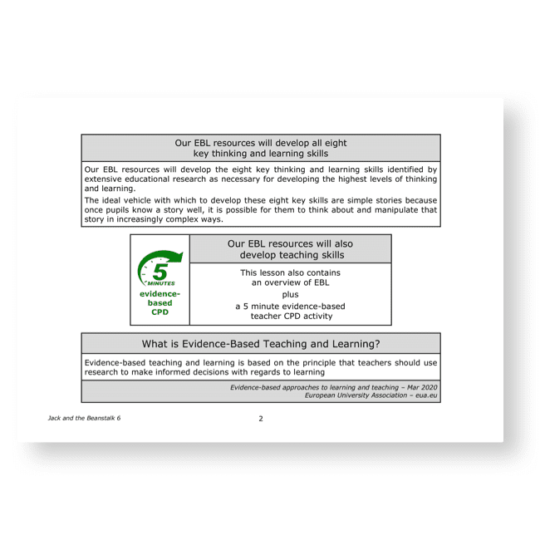
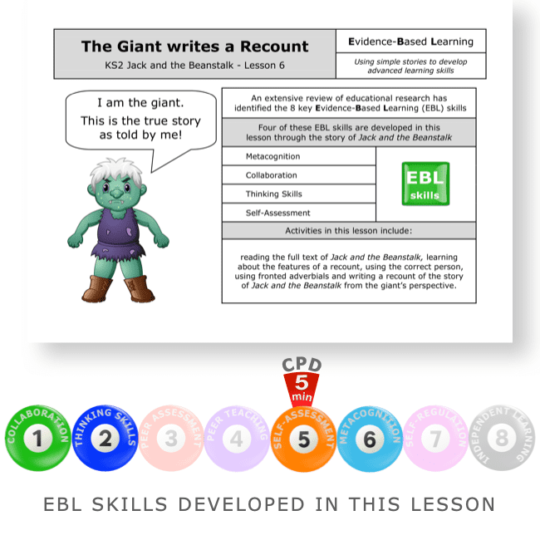
The Giant writes a Recount
£3.00 Add to basket £3.00Add to basket
£3.00Add to basketActivities in this lesson include reading the full text of Jack and the Beanstalk, learning about the features of a recount, using the correct person, using fronted adverbials and writing a recount of the story of Jack and the Beanstalk from the giant’s perspective.
There is a five-minute evidence-based CPD activity at the end of this lesson which will develop classroom teachers’ skill set. This CPD consists of a research extract on self-assessment with a five-minute activity based on this extract.
VIEW -
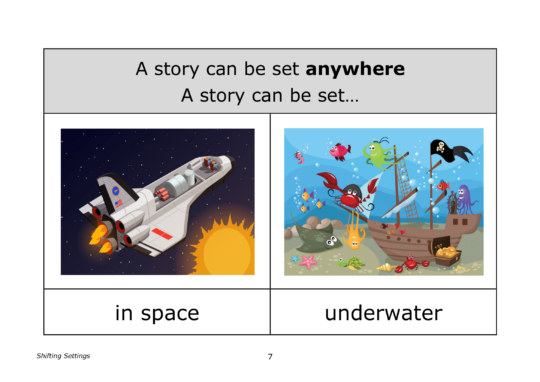

Y5 Shifting Settings
£3.00 Add to basket £3.00Add to basket
£3.00Add to basketKS2 National Curriculum:
✓ Exploring narrative changes in location, time, and mood
✓ Writing connected events showing setting shifts
✓ Using cohesive devices to link paragraphs
✓ Peer evaluation using success criteriaThis lesson looks in detail at the four main reasons why the setting in a story can change: the action in the story moves to a different setting, the characters in the story move to a different setting, the setting stays the same but the time of day changes and the setting stays the same but the weather changes. Activities include answering higher and lower order questions.
There is a five-minute evidence-based CPD activity at the end of this lesson which will develop classroom teachers’ skill set. This CPD consists of a research extract on self-assessment with a five-minute activity based on this extract.
VIEW -
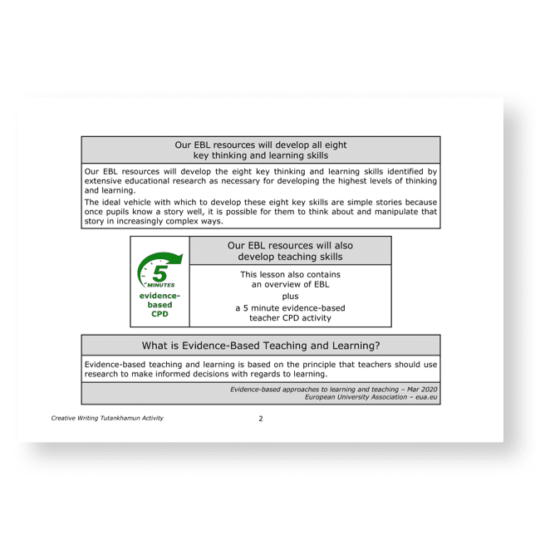
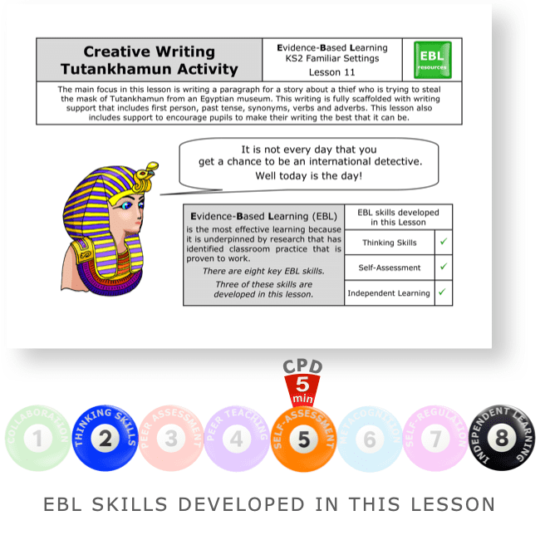
Creative Writing Tutankhamum Activity
£3.00 Add to basket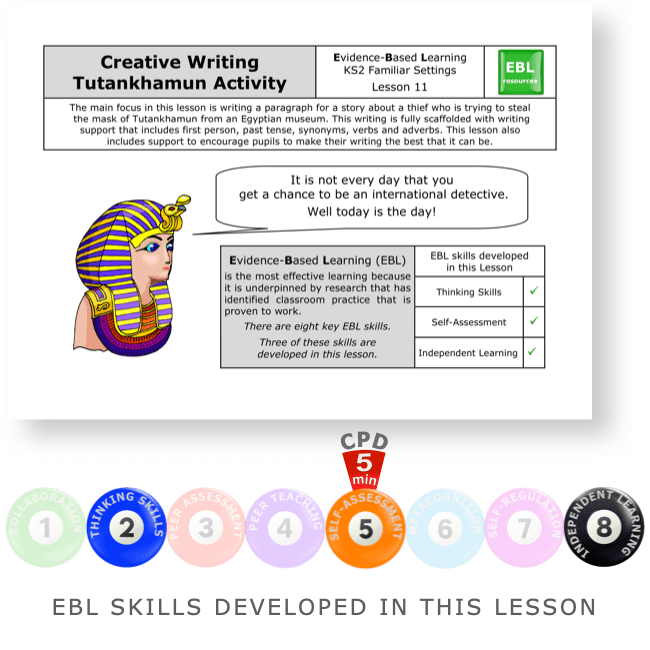 £3.00Add to basket
£3.00Add to basketThe main focus in this lesson is writing a paragraph for a story about a thief who is trying to steal the mask of Tutankhamun from an Egyptian museum. This writing is fully scaffolded with writing support that includes first person, past tense, synonyms, verbs and adverbs. This lesson also includes support to encourage pupils to make their writing the best that it can be.
There is a five-minute evidence-based CPD activity at the end of this lesson which will develop classroom teachers’ skill set. This CPD consists of a research extract on self-assessment with a five-minute activity based on this extract.
VIEW -
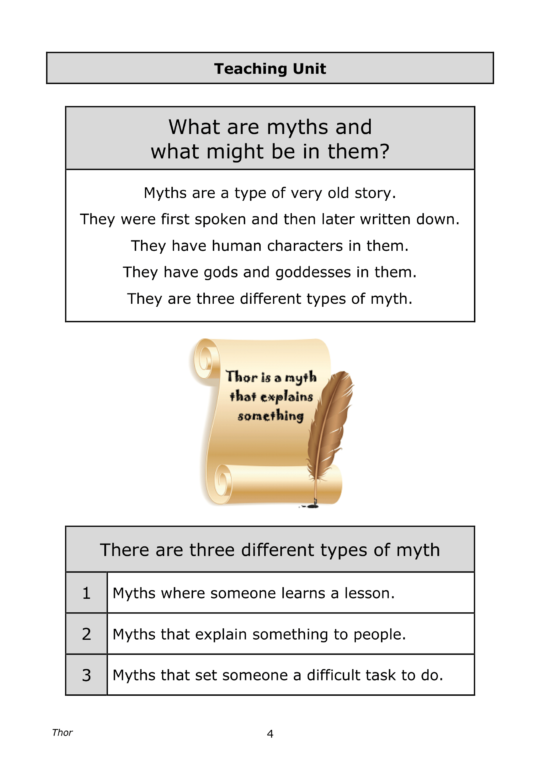
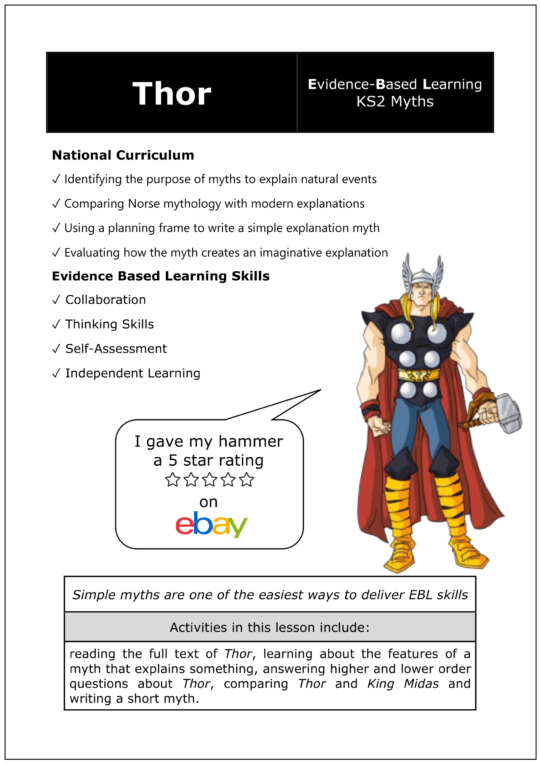
Y5 Thor
£3.00 Add to basket £3.00Add to basket
£3.00Add to basketKS2 National Curriculum:
✓ Identifying the purpose of myths to explain natural events
✓ Comparing Norse mythology with modern explanations
✓ Using a planning frame to write a simple explanation myth
✓ Evaluating how the myth creates an imaginative explanationActivities in this lesson include reading the full text of Thor, learning about the features of a myth that explains something, answering higher and lower order questions about Thor, comparing Thor and King Midas and writing a short myth.
There is a five-minute evidence-based CPD activity at the end of this lesson which will develop classroom teachers’ skill set. This CPD consists of a research extract on self-assessment with a five-minute activity based on this extract.
VIEW






Philipem (verified owner) –
We asked a.i. to review this lesson. This is what it said:
Teachers – Fantastic New Resource for Teaching English and Higher Order Skills Rating: ⭐⭐⭐⭐⭐
I’ve just come across an excellent ready-to-use KS2 lesson called “Rabbit Holes and Wardrobes” that cleverly develops English and cognitive skills through the theme of fantasy stories.
In this lesson, students analyse the use of portals and the passing of time in well-known fantasy tales. Activities get pupils thinking about the narrative purpose and logic of portals as magical doorways to fantasy worlds.
Higher order questions then consolidate and extend this knowledge, challenging students to apply their understanding in hypothetical scenarios. For example:
“Imagine you left school on a Friday at 3pm and unexpectedly went through a portal to a fantasy world and stayed there for 2 days. What day and time would you arrive home?”
As well as building content knowledge, these activities develop key evidence-based learning skills like critical thinking, metacognition and self-assessment.
There’s even a 5 minute CPD excerpt and activity on the research evidence for self-assessment, allowing you to enhance your own professional knowledge as you teach.
So if you’re looking for an engaging English lesson that secretly develops advanced cognitive abilities, this fantasy-based resource comes highly recommended. The combination of literacy and higher order skills makes it a lesson of two halves – but the whole is definitely greater than the sum of its parts!